The prime minister for the U.N.-certified winner of Ivory Coast's presidential election says African Union mediation is the last chance for a peaceful resolution of the political crisis. The incumbent government says it will not accept any mediation that challenges the president's re-election.
The African Union's latest effort to resolve the political crisis in Ivory Coast is having problems before it gets started.
Members of the heads-of-state panel differ over the possible use of force to remove incumbent President Laurent Gbagbo. Gbagbo supporters oppose the inclusion of the Burkina Faso president on the panel because he is an ally of Gbagbo's rival, Alassane Ouattara.
Gbagbo's foreign minister says his government will not accept any finding that questions the legitimacy of the constitutional council annulling nearly 10 percent of all ballots cast, which made Gbagbo the winner.
Ivory Coast's Electoral Commission and the United Nations say results shows Ouattara winning, even if most of the contested votes are thrown out.
Ouattara's prime minister, Guillaume Soro, says the African Union mission is the last chance for a peaceful resolution of the crisis.
Soro says the five heads of state will go to Ivory Coast to ask the elected president to explain the guarantees he will offer to the losing president. Soro says Ouattara has promised if Gbagbo agrees to leave power, Ouattara will accord him the status of a former president with all of its privileges.
Having served as Gbagbo's prime minister for more than three years, Soro told VOA that he does not expect the incumbent president will abide by the decision of the African Union, because the alliance already recognizes Ouattara.
"AU recognized Alassane Ouattara as the elected president of Cote d'Ivoire," he said. "And I think that it is a victory for democracy in Cote d'Ivoire. It is a victory of the people of Cote d'Ivoire."
Human Rights Watch says Gbagbo allies are killing and raping Ouattara supporters in post-election violence. The United Nations says peacekeepers are being blocked from suspected mass grave sites.
Soro says those responsible for that violence must be brought to justice.
"The struggle for freedom and the fight for democracy is not easy," he said. "In the history of our continent, the struggle for freedom generally generates crimes and killings and everything."
Both of Ivory Coast's competing governments went into the African Union summit hoping for decisive action against their rival. Instead, they got a panel of heads of state. Soro says he is not disappointed.
"No, no, no. I am not disappointed. I am a fighter," said Soro. "When you fight for democracy you can not be disappointed."
The leaders of Burkina Faso, Chad, Mauritania, South Africa, and Tanzania make up the African Union panel. They met Monday to outline their strategy and must now decide when to visit Abidjan and how to approach the country's rival presidents.
AU Mission in Ivory Coast Encounters Obstacles




